US 'Not Interested' In Khamenei's Views On Saudi-Israel Normalization

Washington says it has no interest in Supreme Leader Khamenei's perspective on the ongoing normalization of ties between Israel and its Arab neighbors.

Washington says it has no interest in Supreme Leader Khamenei's perspective on the ongoing normalization of ties between Israel and its Arab neighbors.
On Tuesday, embittered by the region’s rapidly warming ties to Iran’s archenemy Israel, he stated that governments engaging in normalization would be “betting on a losing horse”.
In response, Deputy US State Department spokesman Vedant Patel commented during a press briefing, "I’m not sure that we are really interested in the supreme leader’s point of view on this, when it comes to what we think could be a potentially transformative normalization agreement for the region."
Referring to US-brokered talks underway to formalize Saudi-Israel relations, he asserted that the benefits of normalization, including building a united force against Iran’s regional proxies, far outweighs any such talk of risk.
Saudi would be the latest country to join the transformative normalization begun under the Abraham Accords in 2020, when countries including the United Arab Emirates and Bahrain broke a decades long stalemate, resulting in huge economic benefits in addition to security ties.
Israeli Prime Minister Benjamin Netanyahu also dismissed the Iranian leader’s statement.
“While Khamenei’s terrorist regime exports ruin and destruction, Israel is advancing progress and peace,” Netanyahu said.
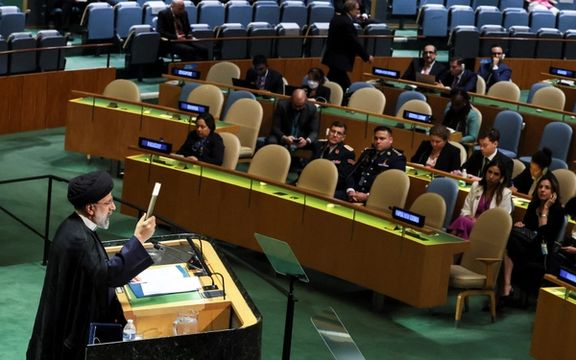
US lawmakers have introduced a bipartisan bill to deny entry to sanctioned individuals attending UN meetings, following the visit of Iran's president in September.
Representatives Joe Wilson and Jared Moskowitz, members of the House Foreign Affairs Committee, sponsored the bill. If enacted into law, it would prevent Iranian President Ebrahim Raisi from attending the next UN General Assembly in New York.
Announcing the bill, Rep. Wilson stated, "Mass murderer and terrorist Ebrahim Raisi hates the United States, pledges death to America, yet applies for and is granted permission to travel to New York annually for the United Nations. This hypocrisy is unacceptable."
Iranian activists have long called for such measures, particularly opposing Raisi's presence in New York due to his involvement in the infamous 'Death Committee' responsible for the summary execution of up to five thousand Iranian political prisoners in 1988.
"[This bill] ensures that the oppressors of freedom in Iran do not get to visit the United States to enjoy the liberties here that they deprive their citizens of at home in Iran," Rep. Wilson added in a statement introducing the bill.
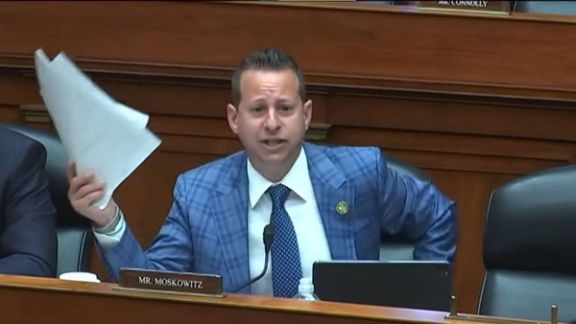
Rep. Moskowitz, cosponsoring the bill, questioned on X (formerly Twitter): "The United Nations is meant to be a forum for peace & stability. Why would we give the Iranian regime and other malign actors a platform, given their kidnapping of Americans and support for global terrorism?"
This year's UN General Assembly coincided with a deal to release US hostages in Iran between the United States and the Islamic Republic. Five Iranian-American prisoners were allowed to leave Iran in exchange for the release of $6 billion in frozen Iranian oil revenues from South Korea. The Biden administration faced criticism for this deal, with concerns that it might embolden the Islamic Republic to take more hostages. Additionally, the Biden administration agreed to the release of $2.7 billion from Iraq.
The new bill, named the 'No Paydays for Hostage-Takers Act,' includes extensive sections on Iran's frozen assets and the $6 billion release. It requires the US President to submit an itemized list of all transactions involving the use of these funds, including details of parties involved, financial institutions, goods purchased, destinations, end users, notification dates, and transaction dates.
The bill also mandates the US President to review all cases of hostage-taking by the Iranian regime every six months, determining whether those responsible meet the criteria for sanctions under the Levinson Act.
The bill's namesake, Robert Levinson, was a former DEA and FBI agent who disappeared in Iran in 2007. He was declared dead in custody in 2020 despite efforts by his family to secure his release.
Rep. Moskowitz expressed his commitment to the bill, emphasizing Levinson's case as a constituent matter: "When Iran wrongfully detains one of our own, they must know that the U.S. will not sit back; we will take action and respond."
Additionally, the bill requires the Secretary of State to assess whether US travel to Iran poses "an imminent danger to the public health or physical safety of US travelers" and whether to invalidate US passports for travel to Iran. The US Secretary of State has the authority to restrict American travel to foreign countries, as demonstrated in the case of North Korea in 2017 following the torture and death of Otto Warmbier.
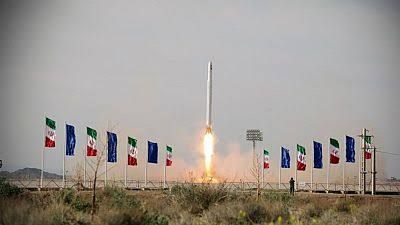
The United Kingdom has criticized Iran's launch of the Nour-III satellite, characterizing it as a blatant disregard for international constraints.
On September 27th, Iran announced the satellite's successful launch using the Qased Space Launch Vehicle, which incorporates technology crucial for the development of a long-range ballistic missile system. The announcement comes at a time of escalating tensions between Iran and Western nations.
“Iran has taken this action despite repeated calls from the UN Security Council to halt its ballistic-missile program. Iran’s actions further prove its disregard of international restrictions and highlight the grave threat posed by the regime to global security,” the Foreign Office declared in a statement on Tuesday.
“Alongside partners, the UK remains committed to taking every diplomatic step to prevent Iran from developing nuclear weapons and to hold the regime to account for its malign activity around the world."
The controversy is not new for the regime. The United States has also accused Iran of contravening the UN Security Council regulations over the years through its satellite programme. As far back as 2017, then-US State Department spokeswoman Heather Nauert called Iran's latest launch "provocative", stating it violated Tehran's 2015 nuclear agreement with world powers. She said: "We consider that to be continued ballistic-missile development."
Iran has a track record of promptly announcing successful space launches through its state-run television channels while often remaining silent on failed attempts. Over the past decade, Iran has launched several short-lived satellites into orbit and even sent a monkey into space in 2013. However, there have been five consecutive unsuccessful launches in the Simorgh program, which involves satellite-carrying rockets.
Additionally, in a separate incident, a fire at the Imam Khomeini Spaceport in February 2019, resulted in the deaths of three researchers, as reported at the time.
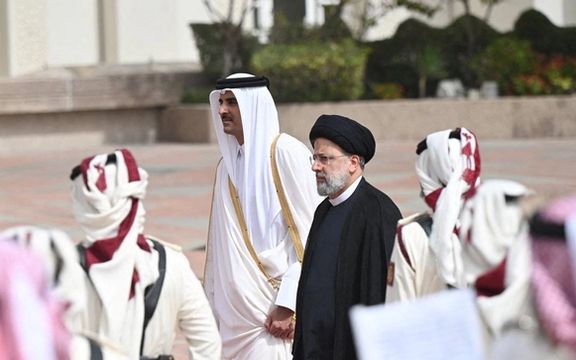
US President Joe Biden called to thank Qatar’s Emir Sheikh Tamim al-Thani for his help in releasing five Americans held in Iran, the two countries announced Tuesday.
The United States agreed in August to allow the release of $6 billion blocked in South Korea and five Iranian regime agents in US prisons to free five American Iranian dual nationals arrested and held in Iran.
Qatari Emir’s office highlighted the call by issuing a statement saying, "During the call, the strategic relations between the two countries and aspects of supporting and strengthening them in various fields were reviewed.”
The White House said the two leaders "discussed their commitment to deepen defense and security cooperation in the region."
Many US lawmakers and analysts criticized the White House for having agreed to pay the “largest ransom” in history and warned that such a large monetary reward for hostage taking will inevitably endanger more Americans around the world.
Qatar is considered a US ally in the region by hosting American military forces but is also one of the few friends Iran has among Arab countries. Last year, Biden designated Qatar as a major non-NATO ally of the United States, fulfilling an earlier promise that he had made to them.
The prisoner release deal, preceded by a US approval to free $2.7 billion of Iran’s money blocked in Iraq is seen as a step to reduce tension and facilitate talks over Iran’s nuclear program.
Qatar has recently held separate bilateral meetings with the United States and Iran that touched on Iran's nuclear program and US concerns about Iranian drone transfers to Russia, sources have told Reuters.

Security is tense around a Tehran hospital where a teenage girl is comatose following an encounter with hijab enforcers, a scenario similar to the night Mahsa Amini died.
On Sunday, Armita Geravand lost consciousness when her head hit a pole, reportedly following a dispute over her hijab with hijab enforcers who shoved her against a pole inside a subway car in Tehran. On Tuesday night, Hengaw Organization for Human Rights, a Kurdish rights group, published a photo of her in the Fajr hospital’s intensive care unit, still in a coma, while security forces have surrounded the hospital to prevent people from gathering and protesting.
The regime has deployed hijab police to all subway stations across Tehran as Iran intensifies the enforcement of hijab, which has become extremely stringent since last September when 22-year-old Iranian-Kurdish woman Mahsa Amini died in police custody, sparking the Women, Life, Freedom protests. Geravand is from Kermanshah, a city with a significant Kurdish population.

Authorities are handling the situation exactly as they did in the case of Mahsa Amini. They arrested the journalist who wanted to report on Geravand’s situation and aired a video of her parents at the hospital who apparently described the situation as an accident.
In the video, described by a large number of Iranians on social media as “forced confessions,” Armita’s mother said, fighting back tears, "I think she fell... I think they said she collapsed, fell to the ground, her head hit the edge of a subway platform, and her friends took her out..."
Authorities in Iran have repeatedly resorted to airing forced confessions of family members to dodge responsibility for the deaths of people during protests and in detention.
According to the reformist newspaper Shargh, reporter Maryam Lotfi, who followed the victim to the hospital to report the incident, was arrested. She was said to have been released on Monday evening. The main journalists who reported on the death of Mahsa Amini, interviewed her parents, and attended her funeral have been in prison for about a year now.
Masoud Dorosti, the CEO of the Tehran Metro Operation Company, claimed that Geravand’s loss of consciousness was likely due to a drop in blood pressure and asserted that there is no recorded footage of her fainting by anyone, including metro staff.

Iranian state media released a short video on Monday in which an unconscious girl is being pulled out from inside a subway car, but there is no footage of her entering the metro, getting inside the car, or the moment she lost consciousness. There are numerous cameras at various spots in metro stations, including inside the cars, as the regime seeks to use the footage against those who defy mandatory hijab rules.
According to a popular social media account, all the footage from the last 24 hours of Tehran's metro has been handed over to the Intelligence Organization of the Revolutionary Guards (SAS).
Iranians have been extensively posting to raise awareness about Armita Geravand, making the hashtag of her name in Persian trendy on X (formerly Twitter) with about 300,000 retweets.
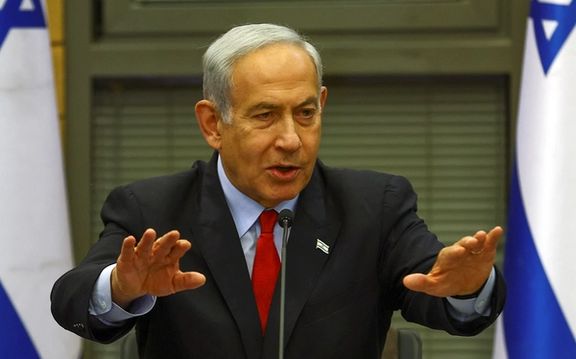
Israeli Prime Minister Benjamin Netanyahu has dismissed Iran's negative remarks about peace with Arabs, saying, "Iran will not prevent [Israel] from further expanding the circle of peace.”
On Tuesday Iran’s Supreme Leader Ali Khamenei warned that governments normalizing relations with Israel would lose, following discussions on Saudi-Israel normalization with US mediation.
US Secretary of State Antony Blinken has stressed that resolving Palestinian issues is crucial for any normalization with Saudi Arabia.
Earlier on Tuesday, Iran's Supreme Leader Ali Khamenei slammed the peace efforts, stating, "The position of the Islamic Republic is that countries that make the gamble of normalization with Israel will lose. They are betting on a losing horse.”
In another comment, Khamenei said, "The Zionist regime is in decline.”
Israel's Defense Minister Yoav Gallant also responded, condemning Iran's regime for threatening peace efforts and stated, "The murderous terror regime in Iran has already succeeded in dissolving several countries it has taken over. Now it is trying to sabotage peace efforts with idle threats."
While Iran reestablished diplomatic ties with Saudi Arabia earlier this year, Iranian officials have consistently criticized Riyadh's attempts to forge relations with Israel, considering it harmful to the Palestinians.
Israeli-Saudi normalization could reshape the Middle East significantly, aligning two major US allies against Iran.
Tehran provides support to militant Palestinian groups, such as Hamas and the Islamic Jihad, which have escalated attacks against Israel and its civilians this year. These groups are part of Iran's network of proxy forces spanning from Iraq to Lebanon and Yemen, receiving both financial and military assistance from Tehran, a fact openly acknowledged by the Iranian government.